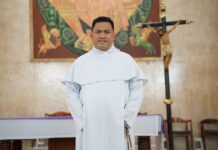LIKE A finely tuned instrument that produces wondrous harmonies, Kabaitan Bautista’s unwavering nationalism and strong influence among the youth continue to reverberate like the beat percussions.
Bautista, a Baguio native, acquired his sense of nationalism from his parents who gave their kids unique names reflecting their Filipino identity. Bautista eventually used nationalism and patriotism to create his music. Having heavy metal rock as his favorite genre, Bautista had a rough transition from screams and amplified tones to the melodious classical tunes, as he entered the Conservatory of Music.
“Pumasok ako nang hindi ako marunong mag-notate ng notes, nang hindi ako marunong magbasa ng mga score. Naaliw naman ako, kaya ko naman pala,” Bautista said.
Despite a few stumbles, he was able to learn how to create orchestrations for operas, symphonies, and string quartets.
Bautista became one of the most promising students of his batch, graduating as cum laude with a degree in Music, major in Composition and minor in Piano performance.
In his last year in UST, he served as secretary of the Central Student Council, president of the Conservatory of Music Student Council and a member of Ayala Young Leaders Congress. He was awarded the Quezon Leadership Award and two St. Dominic De Guzman Awards for his service in both councils.
“If not everyone can see what your leadership is for, it’s all pointless. Kapag hindi kayo isang grupo, there is only a limit to what you can do,” Bautista said.
Finding joy in serving others, he later on harnessed this devotion to teaching, dedicating his time to kids in different provinces of our country, and joining various community programs sponsored by the University. Immersions in places like Tarlac and Olongapo further enkindled his love for teaching.
Tuning in to the country’s song
Bautista’s compositions, such as “Contagion on a theme by Nirvana” and “Harry Potter Fantasy and Super Mario Capriccio based on a theme by Koji Kondo,” have been presented in the Cultural Center of the Philippines. Some of his pieces were also showcased in other countries like France and Indonesia.
As a teacher and volunteer, he got to teach kids how to play classical and native instruments such as the kulintang, a set of gongs used by tribes in Mindanao, and angklung, a bamboo instrument from Indonesia which he used in some of his compositions.
“‘Yung mga kids sa Leyte first time nilang makakita ng violin, cello, at contrabass. Kahit sa Manila, maraming estudyanteng hindi pa nakakahawak ng flute,” Bautista said.
Bautista cited Antonio Africa, his mentor from the Conservatory of Music, as one of his greatest inspirations who told him to always push his students to become more than what they are.
“What else would teaching be for if the next generation will be worse? Ano na lang ang kahahantungan ng kultura natin kung magiging kapantay lang natin yung mga nagtuturo sa atin ngayon?” Bautista said.
One of the highlights of his career was helping Fr. Marlowe Rosales, an alumnus of the University, in teaching the Christ the King Youth Symphony Orchestra in Samar.
“Dito ko na-experience na may batang walang cellphone. Pero ‘yung bata na ‘yun, siya’ yung pinakamasipag at pinakamagaling tumugtog ng cello,” Bautista said.
Although Bautista found it difficult to simplify and contextualize musical concepts for the kids, he saw the job as a reward that provided him with a great sense of fulfillment. He was able to witness his students grow from kids who did not know how to hold instruments to an orchestra that performed in the concluding mass during Pope Francis visit to the Philippines in Luneta last Jan. 18.
He acknowledged that the UST not only trained him tobecome an accomplished musician, but also provided him opportunities and necessary tools to become an inspiration to others through service.
“It’s the holistic growth that is most important, what you learn outside the classroom is more valuable. Improve yourself where you can contribute something,” Bautista said. “You have to work based on your passion, your own motivations. It’s about taking care of the tree and not the fruit. Train your students to become better than you.”
The vibrant beats and melodies that come from his compositions remain as reflections of the colorful music he shares with our fellow Filipino youth.
His love for our country continues to shine through the tunes of his classical compositions as he travels the provinces, playing his own tribute to the country. Vianca A. Ocampo













